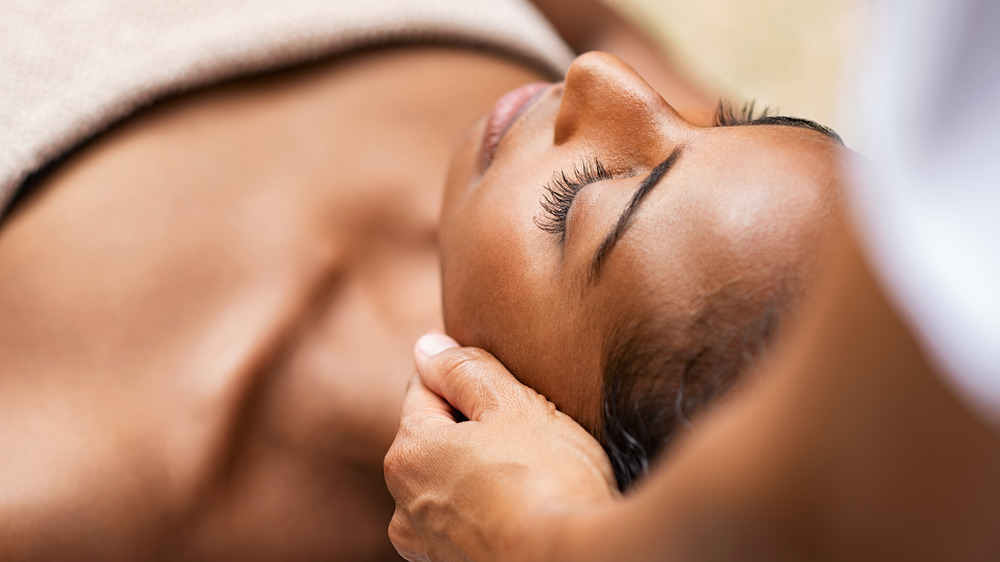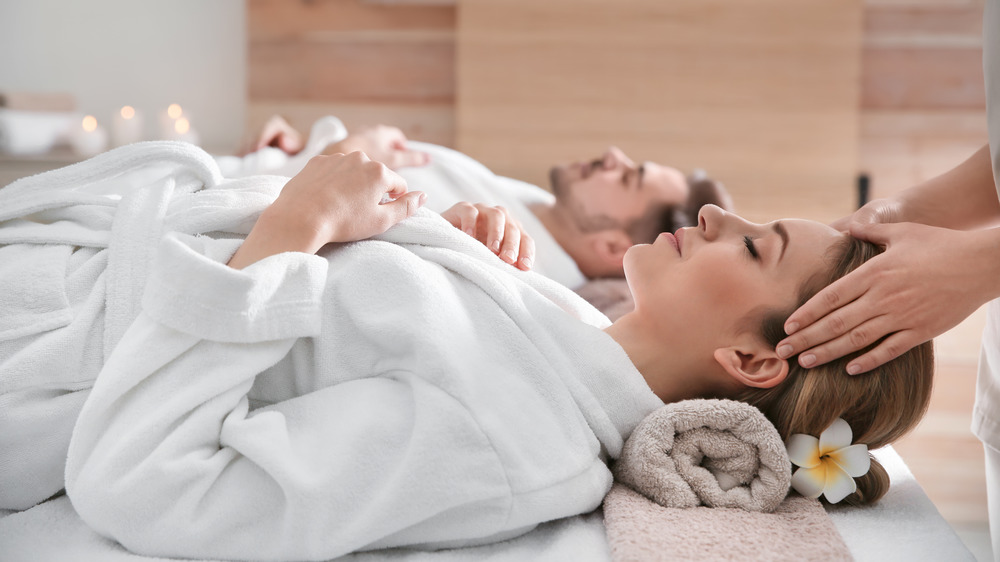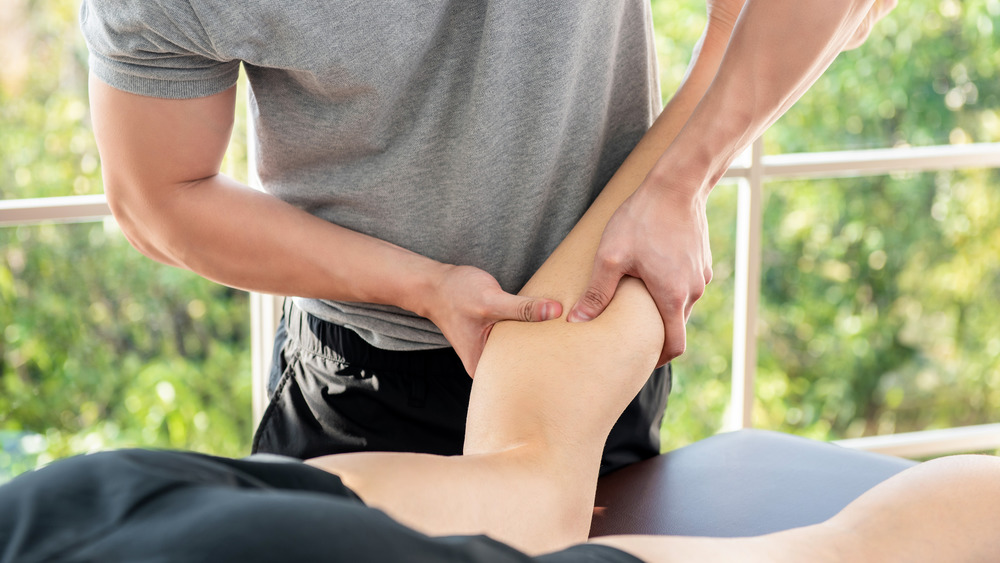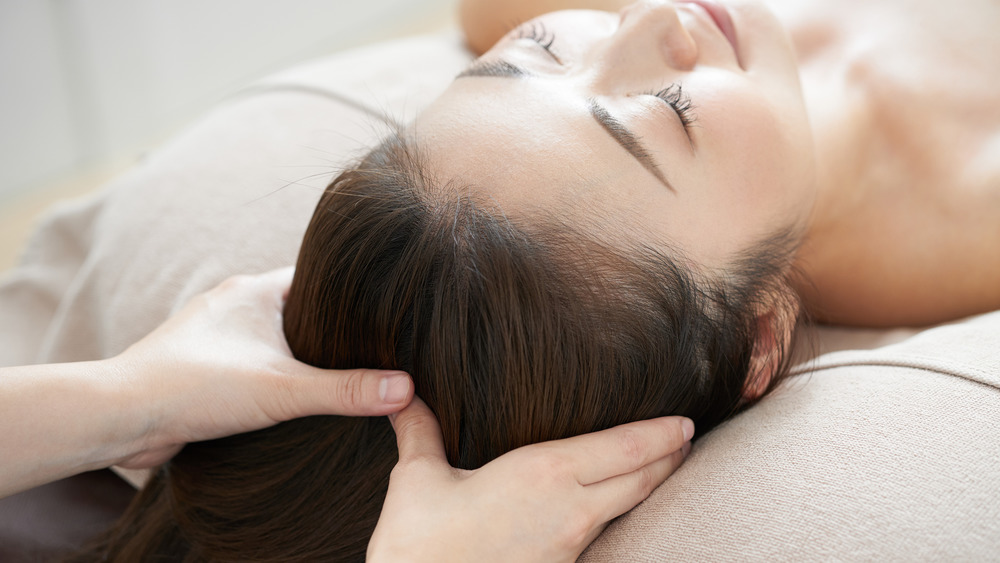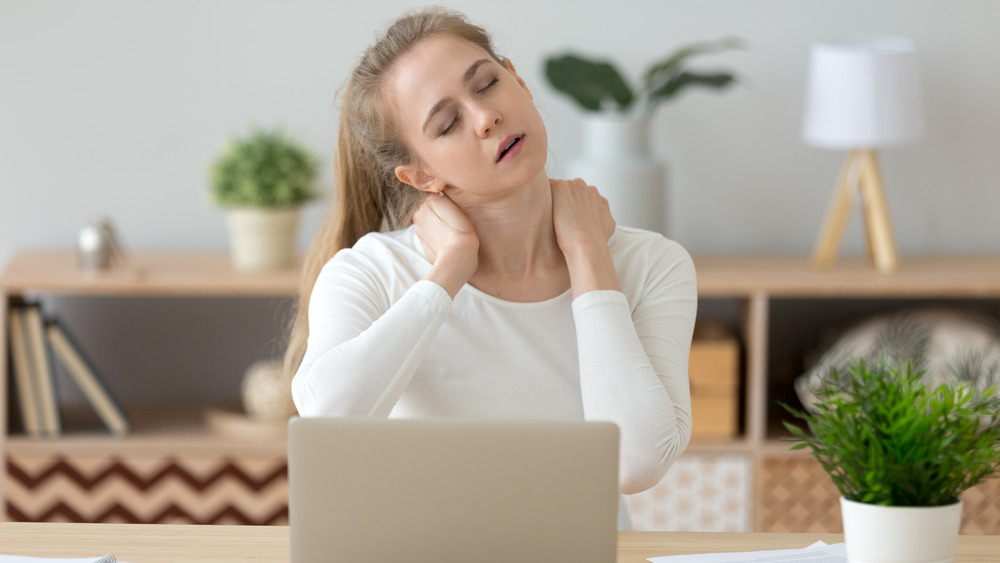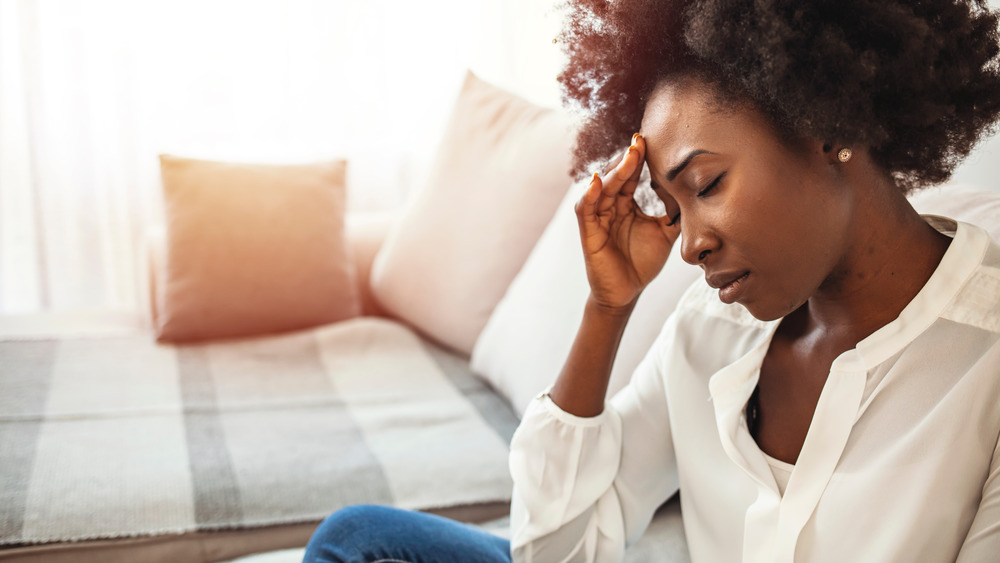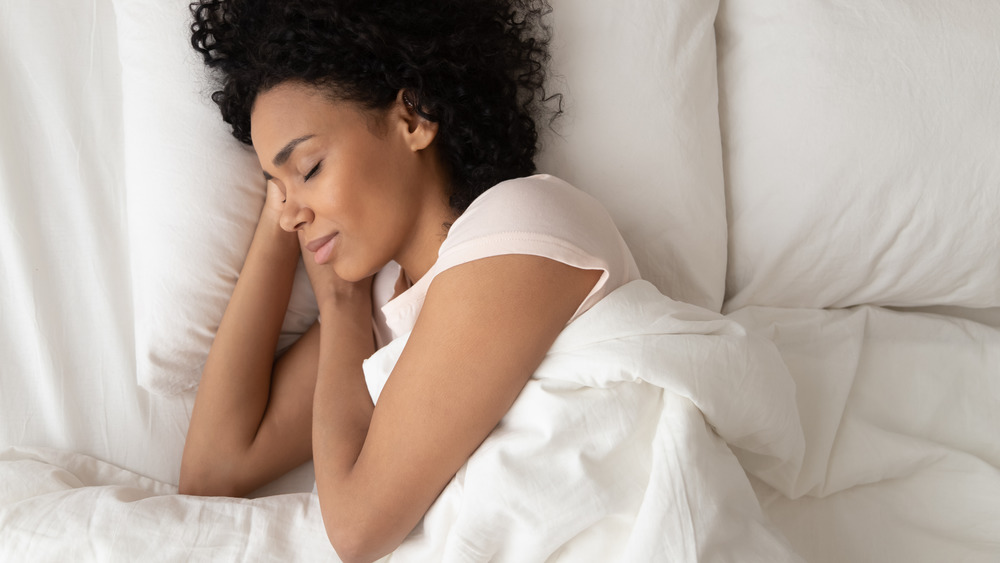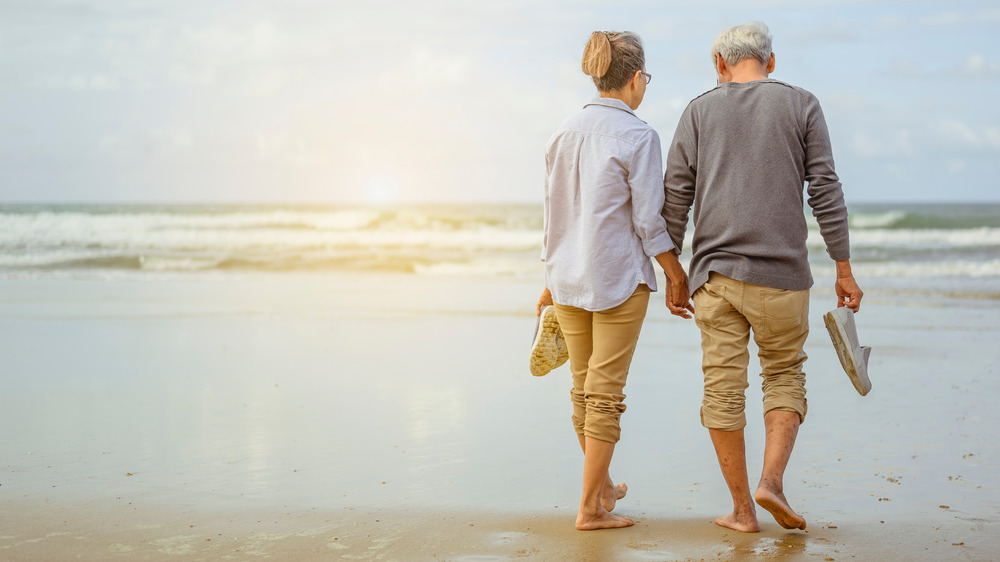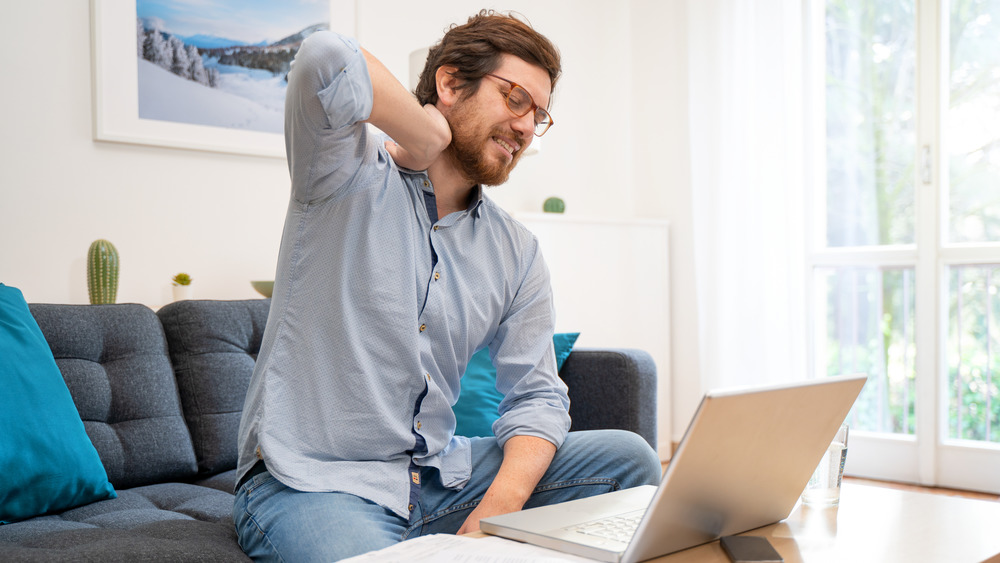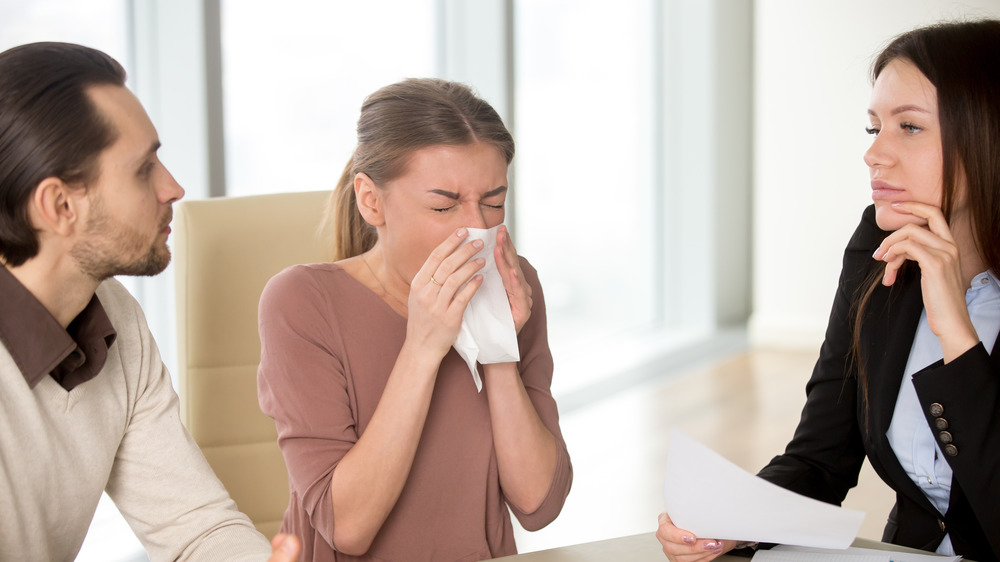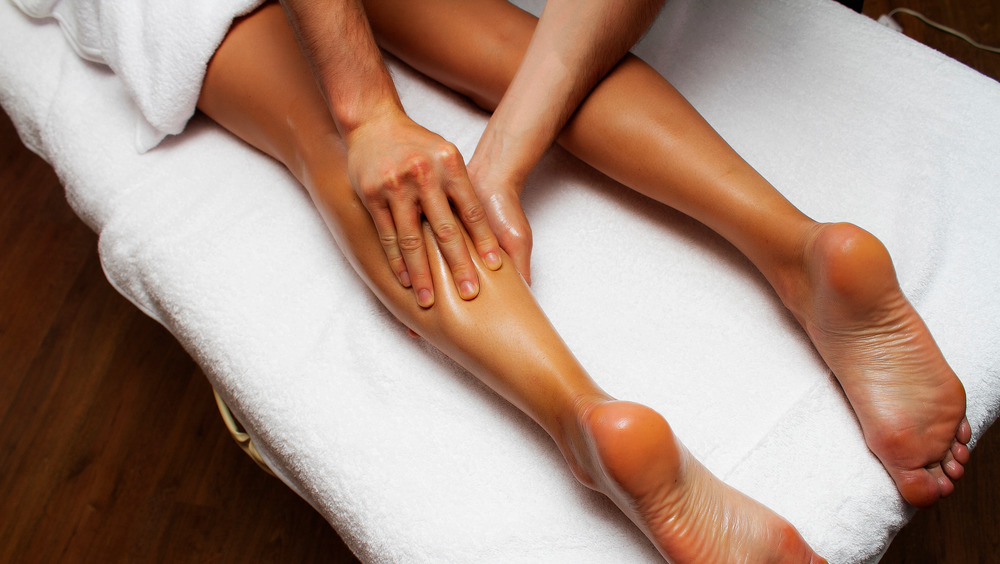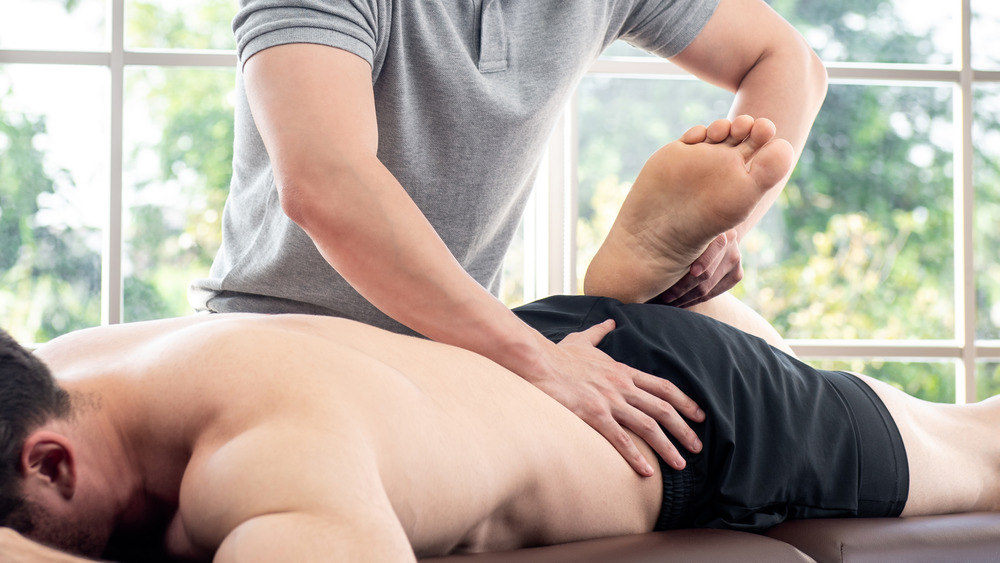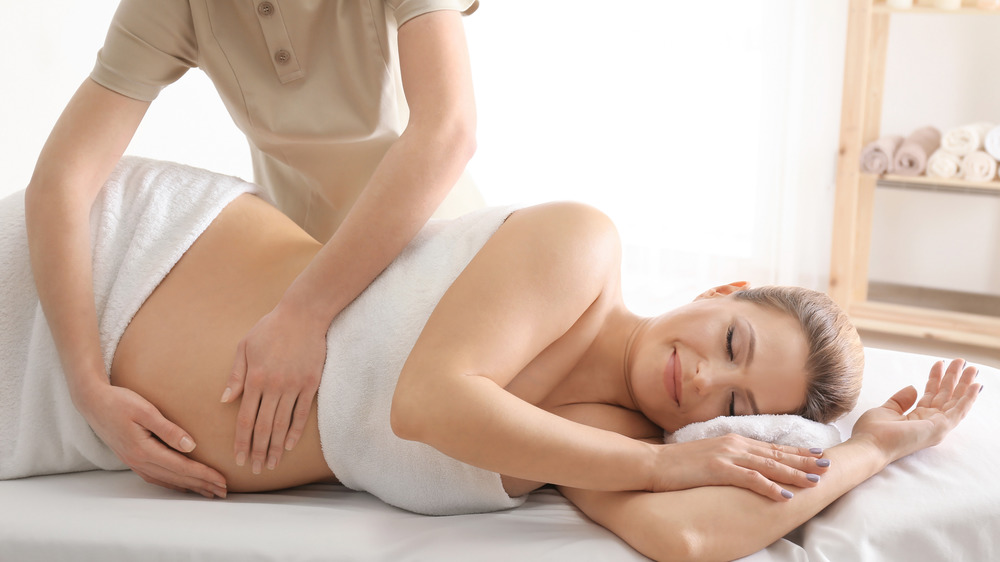Massages Have More Health Benefits Than You Might Have Realized
Massages seem like an indulgent treat, but they actually have health benefits that don't require a prescription or a doctor's visit. And you're not doing your body any favors by not going regularly. "We have so much stress worked up in our bodies — you can't stay on top of it by just getting a massage every once in a while," Karen Taylor, owner of Simply Massage, explained to VailDaily.
By going more often, you can reap many short and long-term health benefits that keep your body healthy, from relieving stress to boosting immunity and reducing your risk for cancer. "Most of the studies have looked at one massage a week," Tiffany Field, director of the Touch Research Institute at the University of Miami, told Time. She then added, "I always say that it's probably like exercise, where more is better." Here are surprising ways a massage can get you living your best life.
Massages help to relieve stress
In a fast-moving world, you're bound to be stressed every once in a while. But stress gradually takes a toll on the body, and without a healthy coping mechanism, you'll likely crash and burn. According to the Mayo Clinic Health System, getting a one-hour massage decreases stress hormone levels called cortisol by 30 percent. As cortisol goes down, serotonin — a chemical in the brain involved in enhancing mood — goes up by 28 percent.
But you don't need a full hour to start feeling the benefits of a massage. A 2020 study published in Scientific Reports found that participants reported feeling less stressed after a 10-minute massage. "Even a brief respite of a 10 to 15 minute massage can make a world of difference in stress levels, and massage is a wonderful way to start the week because it improves mental clarity, focus and boosts energy levels," Michelle Ebbin, massage therapy expert and author of The Touch Remedy told American Spa.
Because stress tightens the muscles and creates knots in the body, Physio.co.uk says deep tissue massage, Swedish massages, and therapeutic massages work wonders to relieve muscle tension that would otherwise restrict movement and increase pain.
Massages help with joint flexibility
Massages are not only good for relieving muscle tension, as they also do wonders for flexibility. Austin Massage Clinic says flexibility is defined as a range of movement done by a joint or groups of joint. According to Advanced Massage, joint flexibility naturally decreases as you get older. Other factors that further reduce joint flexibility are injury, a lack of exercise, chronic sitting, and just not using enough of your joints every day.
Austin Massage Clinic explains that massage can increase overall flexibility in the body and target specific muscles such as the ones found in the legs, back, and hip muscles. A small 2017 study in college students found that calf muscle massages helped make ankle joints more balanced and flexible.
Elements Massage also says massages help keep joints more fluid, decreasing the risk for injuries. They recommend deep tissue, sports massage, and therapeutic massages to increase flexibility.
Massages help with your mental health
While massages focus on physical touch, they can also touch on a person's mental health. "Massage is an excellent way to relieve stress, anxiety, tension, worry, and even depression, and it can be easily incorporated into one's wellness regimen at home and work," Michelle Ebbin, massage therapy expert and author of The Touch Remedy, told American Spa. If that's not all, the American Massage Therapy Association officially states that there's scientific evidence linking massages to lower incidence of depression.
A 2010 study looked at past studies that involved massages and found massages decreased the number of depressive symptoms in an individual. A 2017 review explained that having a massage altered brain activity in the amygdala, anterior cingulate cortex, and hypothalamus. These are three brain areas involved in regulating fear and stress. Along with evidence of brainwaves showing a relaxation response after a massage, the neurological signs correlated with reported decreases in depression, anxiety, and heart rate.
A 2009 study published in Infant Behavior and Development found prenatal massages lowered depressive symptoms and stress levels in pregnant women. There was also a correlation between massage therapy and a reduced chance of premature babies and low birthweight.
Scalp massages give your hair a glow-up
Massages help relieve tension in the body, and that includes your head. "We tend to hold a lot of tension across our hairline, behind our ears, and in the neck; this is mostly due to stress and partly to posture," Christophe Robin, a hairstylist and colorist, told mbglifestyle. "We accumulate quite a lot of tension in these areas and often disregard them."
Simply put: getting a massage helps your body and mind feel more refreshed. "Scalp massages increase the production of serotonin, a chemical in your body that increases your mood," Triana Francois, a hairstylist at Haven Spa in New York City, told HuffPost.
Healthline says several research studies have linked scalp massages to hair growth, including thicker hair. They say scalp massages help by stretching the cells of hair follicles. Stretching then stimulates hair follicles to produce more hair. "By taking deep breaths during your scalp massage, you will enhance the effects of your massage due to the increase of oxygen flow throughout the body. This is beneficial because an increased amount of oxygen flow leads to an increased blood flow, allowing the cells to function at their fullest potential," Francois also told HuffPost.
Massages improve your heart health
Massages relax muscles, and your heart muscle is no exception. According to the Centers for Disease Control and Prevention (CDC), heart disease is the leading cause of death in the United States. The Institute for Integrative Healthcare says that adding massage therapy to other preventative actions such as quitting smoking, eating healthy, and exercising can further help lower heart disease. They also report the various strokes performed in massages can increase blood circulation and stimulate skin receptors to send messages for the central nervous system, especially the body's fight-or-flight-response to relax.
"Massage is also great to increase circulation within the body, which improves tissue quality and allows people to move and function better," Kipp Dye, MSPT, owner of OrthosportsMED Physical Therapy, told Massage Magazine. The relaxation techniques also cause blood vessels to widen, decreasing blood pressure and rapid heart rates. A 2008 study in The Journal of Alternative and Complementary Medicine found an hour-long deep-tissue massage immediately reduced adults' blood pressure.
However, the British Heart Foundation says special precautions need to be taken for people with heart conditions, such as avoiding areas where a pacemaker is implanted and avoiding deep-tissue massages when taking blood thinners.
Massages help manage pain
As massages relieve muscle tension and knots, a benefit of this is reduced pain. "Therapeutic massage can be used to treat a range of conditions, the most common of which is low back pain, followed by neck and shoulder pain. I also use therapeutic massage to treat headaches, jaw pain and Temporomandibular Joint Dysfunction," Arthur Madore, a massage therapist at the Osher Center for Integrative Medicine at Brigham and Women's Hospital, told Brigham Health Hub.
According to Harvard Health Publishing, massages could help stimulate nerve fibers and block pain messages to and from the brain. Different pressures can be tailored to the amount you can tolerate. A 2004 study in The Journal of Alternative and Complementary Medicine suggests that people with chronic pain experience the same therapeutic benefit in a massage than standard medical care. For acute pain, a 2010 study found massages reduced pain levels from an average of 5.18 to 2.33.
With people working on their laptops than ever before, wrist pain is common, and the risk for carpal tunnel increases. A 2016 review found that massages lowered hand pain levels, increased mood, helped with falling asleep easier, and improved grip strength in people with carpal tunnel syndrome.
Massages lower the number of headaches you'll get
The World Health Organization reports that 50 to 75 percent of adults 18-65 years experienced a headache in the past year. About 30% or more experience headache's favorite cousin: migraines.
So when Tylenol doesn't work, massages can help with headaches. "Many patients find massage therapy helpful, in which case I encourage them to make it a regular part of their treatment plan along with other healthy lifestyle habits, relaxation and self-care activities." Dawn Buse, Ph.D., Associate Professor of Neurology at Albert Einstein College of Medicine and the Director of Behavioral Medicine at the Montefiore Headache Center in New York, told the American Massage Therapy Association.
A 2002 study looked at how massage therapy on the head and shoulders affected chronic tension headaches. Not only did they shorten the length of a chronic tension headache, but the number of chronic tension headaches decreased after one week of massage. A 2006 study in the journal Annals of Behavioral Medicine found that people who got massages reduced their number of migraines and improved sleep quality.
A massage helps you sleep better at night
People aren't sleeping as much as they should. The Centers for Disease Control and Prevention (CDC) says "1 in 3 adults don't get enough sleep." Losing sleep is associated with several conditions, including obesity, type 2 diabetes, and heart disease.
According to Sleep.org, massages improve sleep quality by boosting a chemical in the brain called serotonin. They also say getting a 3-minute back massage does more for your health than a 35-minute nap. By managing stress-hormone levels, massage can also reduce the number of sleep disturbances. "It's essentially affecting the hormone levels," Joe Bob Smith, a staff member at the National Holistic Institute and a massage therapist, told Massage Envy. "Studies have shown that massage increases serotonin, which increases the melatonin and helps circadian rhythms to reset."
A 2007 study in the Journal of Bodywork and Movement Therapies found adults reported less pain and fewer sleep disruptions after half-hour massage sessions for five weeks. Meanwhile, a 2014 study found getting a massage helped deal with insomnia in postmenopausal women.
Massages improve balance for older adults
Prone to falls? Maybe it's time to call the masseuse after your doctor's visit. "Relaxed muscles can also reduce pressure on sensitive nerves caused by misalignment, thus alleviating tension and pain caused by structural imbalances. Regular massage encourages balance in your body and helps create the space to move in a more natural, healthy, and free-flowing way," Jenn Grigg, community manager for massage therapists at Zeel, told mbgmindfullness.
According to The You Massage & Therapy Center, falling accidents also happen as we get older because bones get weaker over time. However, getting a massage helps improve blood circulation in the limbs, causing a greater sense of balance.
Massage's ability to improve balance is seen from as little as one session. A 2012 study in the International Journal of Therapeutic Massage & Bodywork found that six weeks of massage therapy improved the sense of balance in older adults. A follow-up study also found immediate benefits to postural stability at one week. After seven weeks, the researchers reported even more improvements to balance.
Massages stop the harmful effects of sitting too much
Sitting is the new smoking. The Mayo Clinic reports that excessive sitting has been linked to obesity, increased blood pressure, high blood sugar, and high cholesterol levels. A majority of us are susceptible to these harmful effects. As Healthline says, our society has evolved to a sedentary lifestyle, including a lot of sitting. In fact, office workers are reported to spend as much as 15 hours a day sitting.
"Most individuals are dealing with some kind of postural stress," Aaron Tanason, registered massage therapist, kinesiologist, and owner at Paleolife Massage Therapy told Best Health Magazine. "More often than not [that stress] tends to manifest in the shoulders and neck."
Massage may help with incorrect postures such as slouching when sitting that cause tremendous strain on the back over time. "Massage helps bring increased circulation to the muscles that support the spine and assists to relax and lengthen muscles," Jenn Grigg, community manager for massage therapists at Zeel, told mbgmindfullness.
Massages boost your immune system
No one likes being sick, and massages may help prevent sickness like the cold or the flu by increasing your immune response. "Researchers working with patients with compromised immune systems have found massage therapy can improve how the immune system functions," Jeff Smoot, President of the American Massage Therapy Association, said in a press statement (via PR Newswire). "Those same benefits translate to people seeking to fight off the common cold, flu and other seasonal illnesses."
A 2001 study in the International Journal of Neuroscience looked at adolescents who were immunocompromised because of HIV who received massage therapy twice a week for 12 weeks. The findings reported more significant mental health and increased immune responses in the adolescents receiving massage therapy than muscle relaxation therapy
In adults, a 2010 study found that receiving one Swedish massage increased several proteins involved in fighting infection. Two years later, the same researchers reported a study finding increased production of proteins associated with the immune system when people received a massage once or twice a week for five weeks.
Massages stimulate the lymphatic system
Massages help boost the immune system, and a major way it does so is by stimulating the lymphatic system. Thought of as the body's sewer system, the Cleveland Clinic explains that the lymphatic system transports excess fluid that's drained from cells and tissues. This fluid is called lymph, and it eventually is dumped back into the bloodstream. Doing so maintains fluid levels in the body.
The lymphatic system has other immune roles, such as protecting the body by producing white blood cells in an invader's presence. "Therapeutic massage manipulates the body's soft tissue, so it also stimulates the flow of fluid in the lymphatic system, which can improve natural immunity. In addition, when received soon after surgery, therapeutic massage can help reduce post-surgery swelling or adhesions," Arthur Madore, a licensed massage therapist told Brigham Health Hub.
Medical News Today says requesting a lymphatic massage helps by decreasing swelling and improving circulation in the body.
Massages help you to be more sporty
Being an athlete requires lots of training, but it's also important not to overwork yourself. "I would highly recommend maximizing your rest days and times. Recovery is just as important as training," Beret Kirkeby, LMT and owner of Body Mechanics Orthopedic Massage, told Women's Health.
According to the American Massage Therapy Association, athletes can improve their performance and recovery through sports therapy. In fact, they say the 2008 Physical Activity Guidelines recommend sports massages for professional athletes and anyone engaging in exercise. Per Verywell Health, sports massages are beneficial for athletes at all training stages from pre-and post-performance, during training, and rehabilitation. What sets this massage apart is that it mainly focuses on the soft tissues used for a specific sport.
"Your sports massage may include, movement, resistance exercise, stretching, mobilizations, and a host of 'other' stuff that has its own results apart from a nice rub," Kirkeby told Women's Health. The outlet lists several benefits to sports massages, including greater flexibility, reducing muscle stiffness, decreasing muscle spasms, increasing joint range of motion, preventing injury, and helping you get a better night's sleep.
Massages can increase the quality of a pregnancy
Having a baby grow inside you is tough, and it's a job that can leave you in aches and pains. Fortunately, prenatal massages set up pregnant women to be safely and comfortably positioned for a massage. According to VerywellFamily, pregnant women are placed on their side for their massage to avoid putting unnecessary pressure on the abdomen as that increases the risk for reduced blood flow. Pillows and padding are also provided to support the body and make the experience more comfortable.
There are many benefits to having a prenatal massage throughout the pregnancy. VerywellFamily says as the belly gets bigger, it helps relieve aches in the lower back, leg, pelvic, neck, and shoulder area. The massages are also best for reducing the swelling commonly found in the legs, ankles, and feet by lowering fluid buildup. A 2010 review reported that women who got massages had shorter labors, shorter hospital stays, and a reduced risk of postpartum depression.
If money is a concern, chair massages may be a cost-friendly alternative. A small 2019 study in the International Journal of Therapeutic Massage & Bodywork found a significant reduction in anxiety and a trend toward less pain after 10-minute chair massages given twice weekly to pregnant women.

